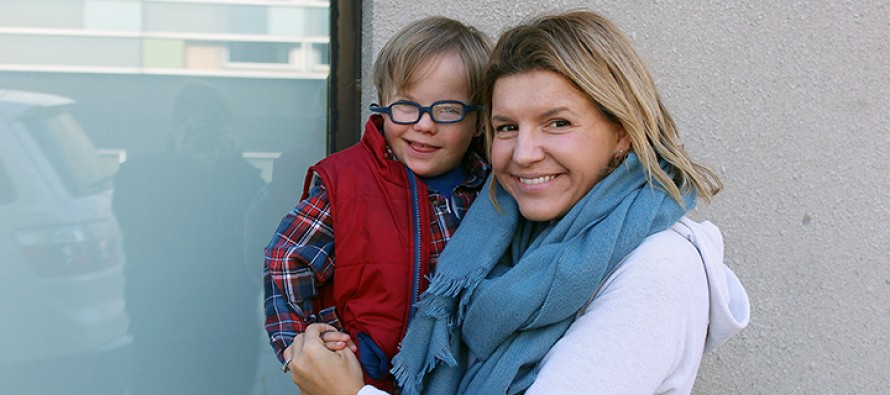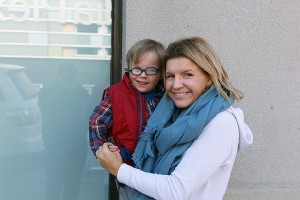Accessible support to those with Down syndrome

By: Lyndi-Colleen Morgan
A Leamington woman would like to see Down syndrome programs and services become more coordinated.
Stephanie Segave is a mother of three and her son Brady Novak, 5, has Down syndrome. Segave volunteers her time at Up About Down, organization that provides services to assist those with family members affected by the syndrome.
Down syndrome is a congenital disorder caused by a chromosome defect where the individual has extra genetic material on 21st chromosome. It can cause intellectual impairment, delayed development and physical abnormalities such as short stature and a broad facial profile. According to the Canadian Down Syndrome Society nearly 800 children with Down syndrome are born every year in Canada.
Up About Down works to improve the lives of individuals with Down syndrome and their families. They provide accurate and positive information through advocacy and education of people in Windsor-Essex County. Up About Down operates under the Windsor-Essex Down Syndrome Association and has been serving the community for close to 20 years.
“We provide families with services like networking. Networking between families allows individuals to share information,” said Segave. “We also have occasional classes like cooking and seasonal events that bring people together.”
Segave said these services are volunteer based and are not the same as those run by the government or private companies. The services offered are meant to bring people together and to get them involved in the community.
She said her son does receive some assistance through his school where he attends regular classes and is helped by a learning support worker. Novak also receives occupational therapy with his fine motor skills, as well as physical therapy and speech therapy.
These free services are limited with the support they can offer. Segave pays for additional speech therapy for Novak and a respite provider so he can attend activities like day camp.
“There are a large number of services available in the community,” said Segave. “Some of the services are funded and some are services that are paid. The problem is the services are spread out. I have to call one place and then call another then call back to the first place. If my job wasn’t as flexible as it is I would have to quit. I think that if there was some form of coordination between the services it might benefit families.”
Sagave said she hopes new technologies can be used to help create coordination between services and information. She also hopes information about each individual’s appointments, nutrition and health concerns could be compiled in the same way.
She said the government Ontario is currently trying to help families by providing them with coordinators. This service is called the Ontario Special Needs Strategy which outlines three steps to identifying children earlier and getting them help sooner, coordinating service planning and making easier support and service deliveries.
This plan involves four ministries which are working with parents, youth, service providers and communities to help children with special needs. They are Children and Youth Services, Health and Long-Term Care, Education and Community and Social Services. The plan of the Ontario government is a system that is coordinated, accessible and centred on the needs of children, youth, adults and their families according to the Ministry of Children and Youth Services website.
Certain organizations are using some of these core ideas in their approach to this issue. Community Living Windsor is one of the organizations utilizing similar methods to assist people in finding services that will fit their desired lifestyle.
Sue Armaleo, a manager of family support at Community Living Windsor, said the services provided by the organization help those who are disabled be more involved in their community. She also said the first step for people to get more involved is changing their view of people with disabilities.
“The language people use is very important and can affect the way people behave,” said Armaleo. “People do say, ‘here’s a Down syndrome person’ instead of ‘here is a person who has Down syndrome’. They should be recognized as a person first, a person who just happens to have a disability.”
More information about support services offered by Community Living Windsor can be found at www.clwindsor.org or contact 519-974-4221.
For information about services offered by Up About Down visit 519-973-6486 or visit www.upaboutdown.org



